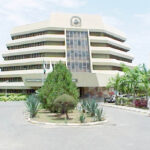Senior university administrators and academics on Wednesday expressed measured commendation over the approval granted by the Federal Executive Council (FEC) for the establishment of 20 private universities.
The Minister of Education, Malam Adamu Adamu, announced FEC decision on Wednesday while briefing State House reporters after the 32nd virtual Federal Executive Council (FEC) meeting presided over by President Muhammadu Buhari.
- 5 years after: Why Nigeria still can’t export beans to Europe
- World Cancer Day: Only 3 public radiotherapy centres in Nigeria
Adamu said the approved universities would get their provisional licenses from the National Universities Commission (NUC).
He said the provisional licenses would be used for the next three years while monitoring and evaluation continue.
Some academics who spoke to Daily Trust said the licensing was a step in the right direction, but urged regulatory institutions not to compromise standards.
The approved universities include: Topfaith University, Mkpatak, Akwa Ibom State; Thomas Adewumi University, Oko-Irese, Kwara State; Maranathan University, Mgbidi, Imo State; Ave Maria University, Piyanko, Nasarawa State, and Al-Istiqama University, Sumaila, Kano State.
Others are Mudiame University, Irrua, Edo State; Havilla University, Nde-Ikom, Cross River State; Claretian University of Nigeria, Nekede, Imo State; NOK University, Kachia, Kaduna State and Karl-Kumm University, Vom, Plateau State.
The list also has James Hope University, Lagos, Lagos State; Maryam Abacha American University of Nigeria, Kano, Kano State; Capital City University, Kano, Kano State; Ahman Pategi University, Pategi, Kwara State, and University of Offa, Offa, Kwara State.
Others are Mewar University, Masaka, Nasarawa State; Edusoko University, Bida, Niger State; Philomath University, Kuje, Abuja; Khadija University, Majia, Jigawa State and Anan University, Kwall, Plateau State.
Nine of the private universities are located in North Central, three in South South, two in South East, five of them in North West and one in South West.
It’s good, but… – Ex-NUC boss
Reacting to the fresh licensing, former Executive Secretary of the National Universities Commission (NUC), Professor Munzali Jibril, described proliferation of private universities as a healthy development, even as he called for strict quality control.
Prof Jibril, who supervised issuance of first set of licenses to private universities in Nigeria while heading the NUC, said the worry should not be in the number of the universities but in their quality and governance.
He said Nigeria still lags behind in providing higher education, comparative to the country’s population and the expected global standard.
“The economy of the 21st Century is a knowledge economy. For a country to thrive under the knowledge economy, it should have not less than 50 percent of its manpower as graduates.”
The emeritus professor of English said Nigeria has only about 12 percent of its population as graduates, while some developed countries have about 80 to 90 percent of the population.
He said since the government does not have the capacity to bridge the gap, private players should be given the opportunity, with government strictly ensuring governance issues in such universities are handled well.
Prof. Jibril said a code of governance for private universities commissioned by the NUC will address lapses in fiscal governance and academic standards, and ensure quality is maintained.
‘It’s a step in the right direction’
Speaking on the development, the Dean, Faculty of Environmental Science, Nasarawa State University Keffi, Professor Nasiru Medugu Idris said it is a right step considering the population of the country which is about 200 million and that there is need to establish more universities that will cater for the teeming population.
“In developed countries there are so many universities to accommodate many students after graduating from secondary schools and in Nigeria it is not. In Abuja for example there is only one public university and few privates, we are supposed to have 40 universities within the federal capital,” he said.
Prof Idris said the federal government is doing what is expected, “The only thing is that most of them are being established based on revenue generation, of which the NUC needs to regulate them.”
On the exorbitant fees charged by the private universities, he said the average private universities charges less than N500, 000, which is affordable unlike top notch ones that are high.
The Deputy Director Academic planning and quality assurance of Federal University Dutse, Dr. Sanusi Ibrahim Chinade, said looking at the dynamic of education it can be a step in the right direction especially for the northern part of the country getting more private universities.
He said: “The problem is that where do these universities get their manpower from because the existing private universities get their manpower from the public universities, of which the public do not have enough manpower”
According to him, these universities being privately owned are a motivation for profit making, an indication that a social responsibility that is supposed to be met by the government is not done, “with the profit making can the common man afford the means to enroll into these universities?, he asked.

 Join Daily Trust WhatsApp Community For Quick Access To News and Happenings Around You.
Join Daily Trust WhatsApp Community For Quick Access To News and Happenings Around You.

